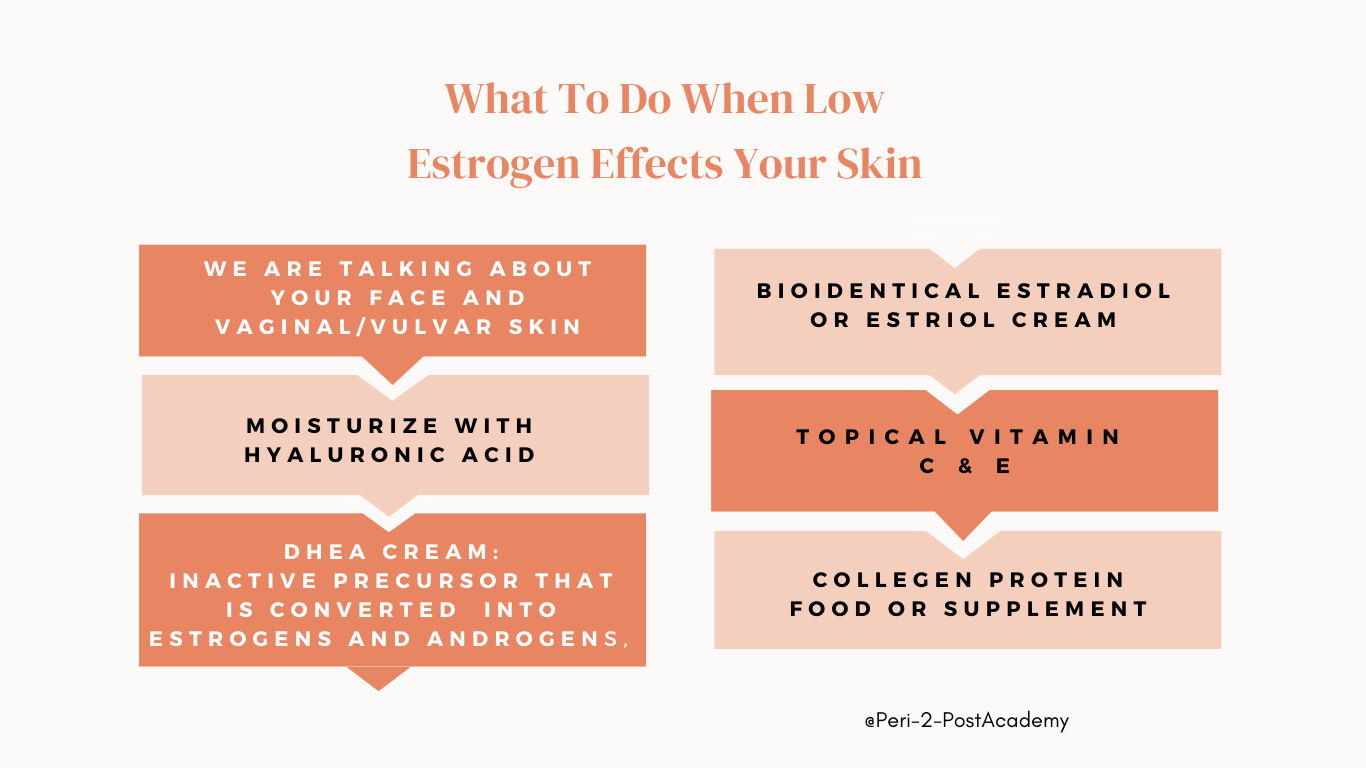Thinner, drier skin
Many women notice that their skin ages quickly in the later Peri-2-Post transition; it gets thinner, has less collagen, is less elastic, wrinkles more easily, and becomes drier.
Estrogen is essential for the production of collagen. Collagen is a critical protein that is present in every cell of your body, Collagen proteins are responsible for the support of the structure of bones, tendons, muscles, ligaments, and skin.
Cells known as fibroblasts are responsible for the production of the collagen found in your skin’s outer layer. Estrogen Receptors (ERβ) receptors are present on the surface of fibroblasts. Estrogen is necessary for the optimal function of these fibroblasts and the production of high-quality collagen. We are aware that estrogen levels decrease during the Peri-2-Post transition. The average woman loses 30% of her facial collagen during the initial five years of menopause. Afterward, the rate continues to decrease by
approximately 1% to 1.5% a year.
Other ways Estrogen Impacts the skin:
- Estrogen facilitates the moisturization of the skin, impacting hydrolaunic acid production.
- Estrogen promotes the skin’s synthesis of elastin,
- Estrogen facilitates wound healing by modulating the inflammatory response.
- Estrogen facilitates the vascularization of the skin.
- Estrogen is essential for the maintenance of healthy and robust hair follicles.
- Estrogen safeguards against oxidative stress.
Dry Skin Solutions:
- Stay hydrated to help keep your skin tight and hydrated.
- Consuming foods high in antioxidants, such as fruits and vegetables, can also help counteract oxidative stress and improve general skin health.
- Use topical Vitamin C and E serums to protect your skin from free radicals. Furthermore, using a retinol product in your skincare routine can help stimulate collagen formation and enhance skin texture.
- Use moisturizers such as hyaluronic acid or ceramides to replace lost moisture and improve skin barrier function.
- Consider using a topical DHEA cream to assist maintain hormonal balance and increase skin collagen and elasticity. DHEA is a precursor to both estrogen and androgens.
- Consider Replacing estrogen with topical estradiol or estriol, which promotes skin elasticity, thickness, and epidermal moisture; it also reduces wrinkles and increases the amount and quality of collagen as well as the degree of vascularization.
- Collagen can be taken as a supplement or in food. Several studies found that Hydrolyzed Collagen (HC) supplementation improves skin hydration and elasticity. Furthermore, long-term collagen use improves skin hydration and elasticity more than short-term collagen use. Not all sources of HC are equally effective. Even at the same dose and period of treatment, certain collagen sources outperform others.
- Monthly facials can also assist to maintain healthy skin by increasing circulation, removing dead skin cells, and moisturizing it. Regular facials can enhance overall skin tone and texture, rejuvenating your complexion.
- Red light treatment stimulates collagen formation, promotes vascularity, and reduces inflammation. It helps to decrease the appearance of fine lines and wrinkles, improve skin tone, and promote healing.
